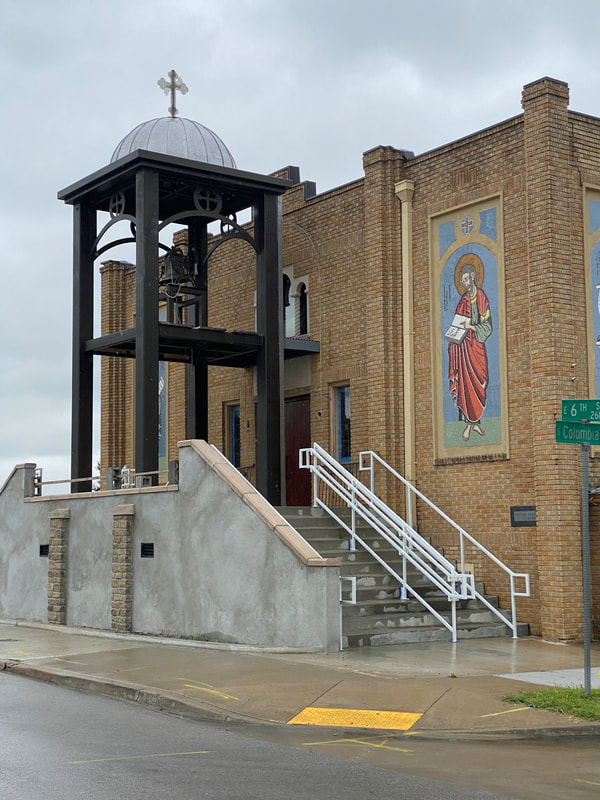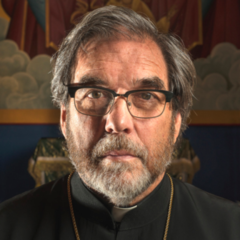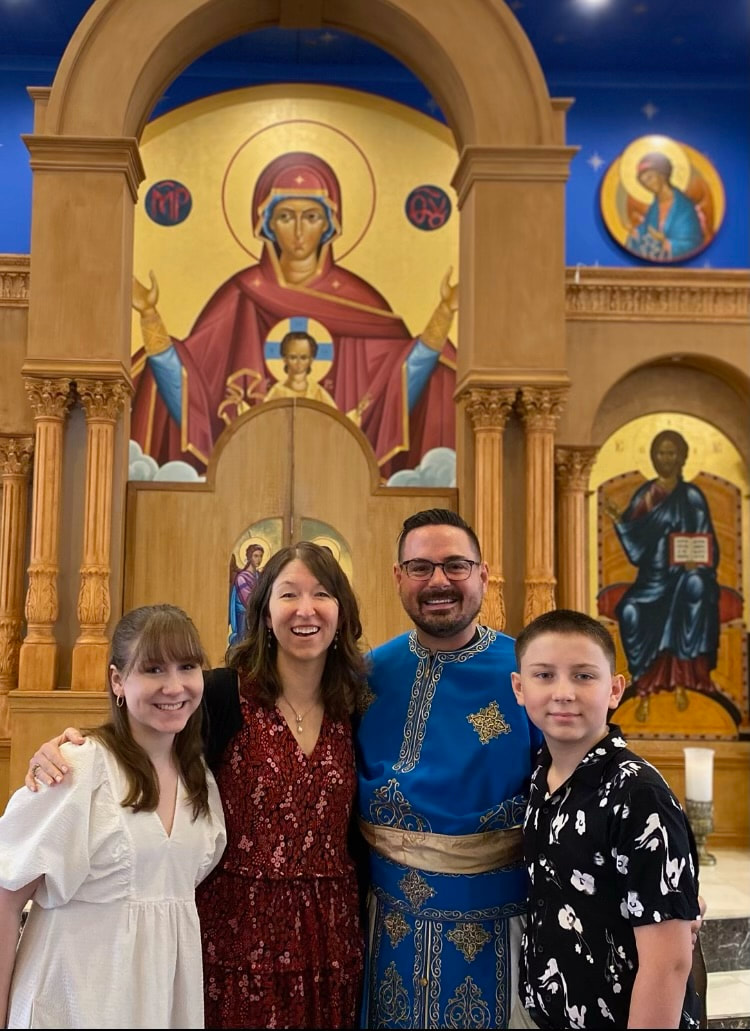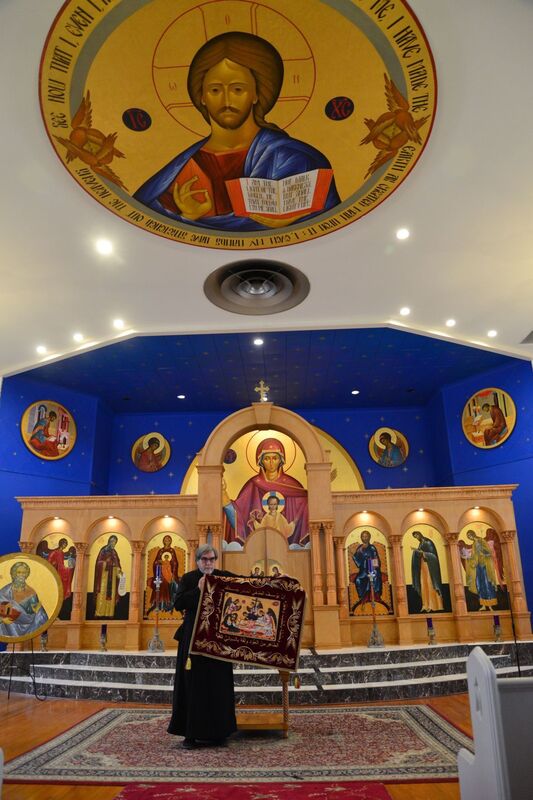-
About Us
-
Our Clergy
-
I'm New
-
Our Beliefs
<
>
Welcome to St. Antony Orthodox Christian ChurchThey devoted themselves to the Apostles' teaching and the fellowship, to the breaking of bread and the prayers." - Acts 2:42 St. Antony is a Christian community of people from various ethnic and social backgrounds sharing a common commitment to Christ, one another, and the Apostolic Faith. We believe Christ restored the whole of creation, including all of our being. We worship together, engaging our whole person, all of our senses, our hearts, and our minds through Divine Grace.
We warmly welcome all families, couples, and individuals who are looking for a deeper faith experience in Christ. Come and see! We have been called by Christ, so that we can become Holy people Fr. George Eber, Parish Priest |
Meet Our Clergy
Fr. George EberParish Priest
|
Fr. Jason BlaisParish Priest
|
Meet Our Parish Council
Welcome to St. AntonyWhere to Start?
St. Antony is a parish where people come together to worship God and so much more. We are a vibrant and diverse faith community made of people of all ages and backgrounds throughout Tulsa and Eastern Oklahoma who are living their faith together and raising their families within the teachings and traditions of the Holy Orthodox Church.
Our parish was started by immigrants from the Middle East who brought their faith to America with them. Over the years, they have shared their faith with others and many of our families have journeyed to the Orthodox Church from other Christian faith traditions and denominations as well as some non-Christian religious and spiritual traditions. Whether you’re on a journey or just wanting to visit an Orthodox parish, you are welcome at St. Antony. Below you can find some answers to commonly asked questions by first-time visitors and those new to the Orthodox Church. |
Frequently Asked Questions
If this is your first time to an Orthodox Church, these questions may help you prepare for Divine Liturgy.
Are non-Orthodox visitors welcome?
Of course! The faith is open to all and you are welcome here. We are always honored to have visitors join us for prayer and worship. We are a community made up of quite a few converts (including our priest and deacons!) and welcome newcomers, inquirers, and visitors. Every sincere seeker of Christ or non-Christian inquirer is welcome. We also know many of the questions you’re going to have about the Orthodox Christian faith and practices; many of us have been there! Don’t be afraid to ask questions about what we do or why we do it.
When you first enter our parish, you are coming into the narthex. If you visit on a Sunday, you’ll be welcomed by a greeter at the door. Feel free to tell the greeter that you’re new and he or she will help you navigate your way around and introduce you to others you can ask questions to. We have copies of our services in the pews so you can follow along, or, if you prefer, simply enjoy the service and join us in our worship of God.
After service on Sunday, you’re invited to join us for our weekly coffee hour, which is a great time to visit with parishioners and meet our priest. If you are not interested in social interaction at first, that’s fine. You are always welcome to follow your own pace and level of interest.
When you first enter our parish, you are coming into the narthex. If you visit on a Sunday, you’ll be welcomed by a greeter at the door. Feel free to tell the greeter that you’re new and he or she will help you navigate your way around and introduce you to others you can ask questions to. We have copies of our services in the pews so you can follow along, or, if you prefer, simply enjoy the service and join us in our worship of God.
After service on Sunday, you’re invited to join us for our weekly coffee hour, which is a great time to visit with parishioners and meet our priest. If you are not interested in social interaction at first, that’s fine. You are always welcome to follow your own pace and level of interest.
How long are the services?
It depends on the service. Below you’ll find a list of our weekly services with their time and lengths.
- Great Vespers (Evening prayers – Saturday nights at 5:00 pm) are usually 45-50 minutes.
- Orthros/Matins (Morning prayers – Sunday morning at 9:00 am) are usually 50-60 minutes.
- Divine Liturgy (Sunday 10 am) runs about 90 minutes. We think that when you have participated in an Orthodox service you will feel like – as one visitor put it – “you have truly worshipped God!” Please view our calendar for additional services throughout the year.
Is there a dress code?
Most people who attend our parish follow the general rule of dressing appropriately and respectfully as we stand before the living God. We have people who wear everything from jeans to suits, long dresses to skirts, sneakers to dress shoes. We do ask that you do not wear shorts, mini-skirts, and that men don’t wear hats.
Is childcare provided?
In the Orthodox Church, children participate in worship from birth and are with their parents at each service. We encourage children to be present in Church for the services. This participation is part of a child’s spiritual formation. If your baby or child gets fussy, talkative, or has a melt-down, or if you need to nurse your baby, we have a cry room upstairs for you to use.
Is Sunday school for children available?
We do have Sunday school on Sunday mornings after Liturgy for children from two years-old through high school.
Should I sit or stand?
The traditional posture for prayer and worship in the Orthodox Church is to stand before the King of the universe! In the Orthodox “old countries” there are typically no pews in the churches. Our parish has pews and you can sit as you need to, but we do ask that you stand during the reading of the Gospel, the Little and Great entrances, during Holy Communion, and when the priest gives a blessing, Just follow the congregation.
Why do people light candles?
Lighting candles is an important part of Orthodox worship and piety. We light candles as we pray, making an offering to God accompany our prayers. Orthodox typically light candles when coming into the church, but there are times when candles should not be lit. Candles should not be lit during the Epistle or Gospel readings, during the Little Entrance, and during the sermon. By the way, you do not have to be an Orthodox Christian to light a candle and pray in an Orthodox church
Can non-Orthodox receive the Holy Eucharist?
Orthodox priests may only serve the Holy Eucharist to baptized members in good standing of the canonical Orthodox Church, who have recently confessed, and fasted before partaking of the Holy Eucharist. This is the ancient tradition of the Holy Church for the 2,000 years of its history. The Orthodox Church understands the Holy Eucharist as a mystery of the real presence of Christ in the Eucharist, not simply as a memorial, or merely in a spiritual sense, as many other non-Orthodox Christians do. We ask that you respect the ancient, apostolic tradition and join us in receiving the Fellowship bread at the veneration of the cross, at the end of the Divine Liturgy.
What is Orthodox worship music like?
Close to seventy-five percent of an Orthodox service is congregational singing. Traditionally, Orthodox do not use instruments. Usually a choir leads the people in a capella harmony, with the level of congregational response varying from parish to parish. The style of music varies as well, from very traditional Byzantine-sounding chant in some parishes, to more Western-sounding four-part harmony in a Russian-tradition church, with lots of variation in between. The music is solemn, prayerful and intended to lead the faithful to worship the living God.
New visitors will find there are many new things to experience in a Holy Orthodox Church service. Feel free to go at your own pace, ask any questions you want, and know you are most welcome to “come and see.”
New visitors will find there are many new things to experience in a Holy Orthodox Church service. Feel free to go at your own pace, ask any questions you want, and know you are most welcome to “come and see.”
How can I learn more?
Each week, Fr. George offers an Inquirers’ Class for those wanting to learn more about the Orthodox faith. There you can ask questions and explore or simply listen to whatever is being discussed. You’re welcome to come to learn.
What if I have further questions?
Feel free to contact us, or talk to one of our faithful, or to our priest or deacons after one of the services or during coffee hour following Sunday Divine Liturgy. If your need is of a pastoral nature, you can call the office or leave an email request to schedule an appointment to meet with a priest.
We also have inquirers' classes that you can get info about on our calendar.
Still have questions? Email Fr. Geroge.
We also have inquirers' classes that you can get info about on our calendar.
Still have questions? Email Fr. Geroge.
Remember with thanksgiving the blessings and the providence of God.
- St Antony the Great
What We Believe
WHAT WE BELIEVE
The Orthodox Church throughout the ages has maintained a continuity of faith and love with the apostolic community which was founded by Christ and sustained by the Holy Spirit. Orthodoxy believes that she has preserved and taught the historic Christian Faith, free from error and distortion, from the time of the Apostles. She also believes that there is nothing in the body of her teachings which is contrary to truth or which inhibits real union with God. The air of antiquity and timelessness which often characterizes Eastern Christianity is an expression of her desire to remain loyal to the authentic Christian Faith.
Orthodoxy believes that the Christian Faith and the Church are inseparable. It is impossible to know Christ, to share in the life of the Holy Trinity, or to be considered a Christian apart from the Church. It is in the Church that the Christian Faith is proclaimed and maintained. It is through the Church that an individual is nurtured in the Faith.
The Orthodox Church throughout the ages has maintained a continuity of faith and love with the apostolic community which was founded by Christ and sustained by the Holy Spirit. Orthodoxy believes that she has preserved and taught the historic Christian Faith, free from error and distortion, from the time of the Apostles. She also believes that there is nothing in the body of her teachings which is contrary to truth or which inhibits real union with God. The air of antiquity and timelessness which often characterizes Eastern Christianity is an expression of her desire to remain loyal to the authentic Christian Faith.
Orthodoxy believes that the Christian Faith and the Church are inseparable. It is impossible to know Christ, to share in the life of the Holy Trinity, or to be considered a Christian apart from the Church. It is in the Church that the Christian Faith is proclaimed and maintained. It is through the Church that an individual is nurtured in the Faith.
REVELATION
God is the source of faith in the Orthodox Church. Orthodoxy believes that God has revealed Himself to us, most especially in the revelation of Jesus Christ, whom we know as the Son of God. This Revelation of God, His love, and His purpose, is constantly made manifest and contemporary in the life of the Church by the power of the Holy Spirit.
The Orthodox Faith does not begin with mankind’s religious speculations, nor with the so-called “proofs” for the existence of God, nor with a human quest for the Divine. The origin of the Orthodox Christian Faith is the Self-disclosure of God. Each day, the Church’s Morning Prayer affirms and reminds us of this by declaring, “God is the Lord and He has revealed Himself to us.” While the inner Being of God always remains unknown and unapproachable, God has manifested Himself to us; and the Church has experienced Him as Father, Son, and Holy Spirit. The Doctrine of the Holy Trinity, which is central to the Orthodox Faith, is not a result of pious speculation, but of the overwhelming experience of God. The doctrine affirms that there is only One God, in whom there are three distinct Persons. In other words, when we encounter the Father, the Son, or the Holy Spirit, we are truly experiencing contact with God. While the Holy Trinity is a mystery which can never be fully comprehended, Orthodoxy believes that we can truly participate in the Trinity through the life of the Church, especially through our celebration of the Eucharist and the Sacraments, as well as the non-sacramental services.
God is the source of faith in the Orthodox Church. Orthodoxy believes that God has revealed Himself to us, most especially in the revelation of Jesus Christ, whom we know as the Son of God. This Revelation of God, His love, and His purpose, is constantly made manifest and contemporary in the life of the Church by the power of the Holy Spirit.
The Orthodox Faith does not begin with mankind’s religious speculations, nor with the so-called “proofs” for the existence of God, nor with a human quest for the Divine. The origin of the Orthodox Christian Faith is the Self-disclosure of God. Each day, the Church’s Morning Prayer affirms and reminds us of this by declaring, “God is the Lord and He has revealed Himself to us.” While the inner Being of God always remains unknown and unapproachable, God has manifested Himself to us; and the Church has experienced Him as Father, Son, and Holy Spirit. The Doctrine of the Holy Trinity, which is central to the Orthodox Faith, is not a result of pious speculation, but of the overwhelming experience of God. The doctrine affirms that there is only One God, in whom there are three distinct Persons. In other words, when we encounter the Father, the Son, or the Holy Spirit, we are truly experiencing contact with God. While the Holy Trinity is a mystery which can never be fully comprehended, Orthodoxy believes that we can truly participate in the Trinity through the life of the Church, especially through our celebration of the Eucharist and the Sacraments, as well as the non-sacramental services.
INCARNATION OF JESUS CHRIST
Together with the belief in the Holy Trinity, the doctrine of the Incarnation occupies a central position in the teaching of the Orthodox Church. According to Orthodox Faith, Jesus is much more than a pious man or a profound teacher of morality. He is the “Son of God who became the Son of Man.” The doctrine of the Incarnation is an expression of the Church’s experience of Christ. In Him, divinity is united with humanity without the destruction of either reality. Jesus Christ is truly God who shares in the same reality as the Father and the Spirit. Moreover, He is truly man who shares with us all that is human. The Church believes that, as the unique God-man, Jesus Christ has restored humanity to fellowship with God.
By manifesting the Holy Trinity, by teaching the meaning of authentic human life, and by conquering the powers of sin and death through His Resurrection, Christ is the supreme expression of the love of God the Father, for His people, made present in every age and in every place by the Holy Spirit through the life of the Church. The great Fathers of the Church summarized the ministry of Christ in the bold affirmation, “God became what we are so that we may become what He is.”
Together with the belief in the Holy Trinity, the doctrine of the Incarnation occupies a central position in the teaching of the Orthodox Church. According to Orthodox Faith, Jesus is much more than a pious man or a profound teacher of morality. He is the “Son of God who became the Son of Man.” The doctrine of the Incarnation is an expression of the Church’s experience of Christ. In Him, divinity is united with humanity without the destruction of either reality. Jesus Christ is truly God who shares in the same reality as the Father and the Spirit. Moreover, He is truly man who shares with us all that is human. The Church believes that, as the unique God-man, Jesus Christ has restored humanity to fellowship with God.
By manifesting the Holy Trinity, by teaching the meaning of authentic human life, and by conquering the powers of sin and death through His Resurrection, Christ is the supreme expression of the love of God the Father, for His people, made present in every age and in every place by the Holy Spirit through the life of the Church. The great Fathers of the Church summarized the ministry of Christ in the bold affirmation, “God became what we are so that we may become what He is.”
SCRIPTURES
The Holy Scriptures are highly regarded by the Orthodox Church. Their importance is expressed in the fact that a portion of the Bible is read at every service of Worship. The Orthodox Church, which sees itself as the guardian and interpreter of the Scriptures, believes that the books of the Bible are a valuable witness to God’s revelation. The Old Testament is a collection of forty-nine books of various literary styles which expresses God’s revelation to the ancient Israelites. The Orthodox Church regards the Old Testament as a preparation for the coming of Christ and believes that it should be read in light of His revelation.
The New Testament is centered upon the person and work of Jesus Christ and the out-pouring of the Holy Spirit in the early Church. The four Gospels are an account of Christ’s life and teaching, centering upon His Death and Resurrection. The twenty-one epistles and the Acts of the Apostles are devoted to the Christian life and the development of the early Church. The Book of Revelation is a very symbolic text which looks to the return of Christ. The New Testament, especially the Gospels, is very important to Orthodoxy because here is found a written witness to the perfect revelation of God in the Incarnation of the Son of God, in the person of Jesus Christ.
The Holy Scriptures are highly regarded by the Orthodox Church. Their importance is expressed in the fact that a portion of the Bible is read at every service of Worship. The Orthodox Church, which sees itself as the guardian and interpreter of the Scriptures, believes that the books of the Bible are a valuable witness to God’s revelation. The Old Testament is a collection of forty-nine books of various literary styles which expresses God’s revelation to the ancient Israelites. The Orthodox Church regards the Old Testament as a preparation for the coming of Christ and believes that it should be read in light of His revelation.
The New Testament is centered upon the person and work of Jesus Christ and the out-pouring of the Holy Spirit in the early Church. The four Gospels are an account of Christ’s life and teaching, centering upon His Death and Resurrection. The twenty-one epistles and the Acts of the Apostles are devoted to the Christian life and the development of the early Church. The Book of Revelation is a very symbolic text which looks to the return of Christ. The New Testament, especially the Gospels, is very important to Orthodoxy because here is found a written witness to the perfect revelation of God in the Incarnation of the Son of God, in the person of Jesus Christ.
TRADITION
While the Bible is treasured as a valuable written record of God’s revelation, it does not contain wholly that revelation. The Bible is viewed as only one expression of God’s revelation in the on-going life of His people. Scripture is part of the treasure of Faith which is known as Tradition. Tradition means that which is “handed on” from one generation to another. In addition to the witness of Faith in the Scripture, the Orthodox Christian Faith is celebrated in the Eucharist; taught by the Fathers; glorified by the Saints; expressed in prayers, hymns, and icons; defended by the seven Ecumenical Councils; embodied in the Nicene Creed; manifested in social concern; and, by the power of the Holy Spirit, it is lived in every local Orthodox parish. The life of the Holy Trinity is manifested in every aspect of the Church’s life. Finally, the Church, as a whole, is the guardian of the authentic Christian Faith which bears witness to that Revelation.
While the Bible is treasured as a valuable written record of God’s revelation, it does not contain wholly that revelation. The Bible is viewed as only one expression of God’s revelation in the on-going life of His people. Scripture is part of the treasure of Faith which is known as Tradition. Tradition means that which is “handed on” from one generation to another. In addition to the witness of Faith in the Scripture, the Orthodox Christian Faith is celebrated in the Eucharist; taught by the Fathers; glorified by the Saints; expressed in prayers, hymns, and icons; defended by the seven Ecumenical Councils; embodied in the Nicene Creed; manifested in social concern; and, by the power of the Holy Spirit, it is lived in every local Orthodox parish. The life of the Holy Trinity is manifested in every aspect of the Church’s life. Finally, the Church, as a whole, is the guardian of the authentic Christian Faith which bears witness to that Revelation.
COUNCILS AND CREED
As Orthodoxy has avoided any tendency to restrict the vision of God’s revelation to only one avenue of its life, the Church has also avoided the systematic or extensive definition of its Faith. Orthodoxy affirms that the Christian Faith expresses and points to the gracious and mysterious relationship between God and humanity. God became man in the person of Jesus Christ not to institute a new philosophy or code of conduct, but primarily to bestow upon us “new life” in the Holy Trinity. This reality, which is manifest in the Church, cannot be wholly captured in language, formulas, or definitions. The content of the Faith is not opposed to reason, but is often beyond the bounds of reason, as are many of the important realities of life. Orthodoxy recognizes the supreme majesty of God, as well as the limitations of the human mind. The Church is content to accept the element of mystery in its approach to God.
Only when the fundamental truths of the Faith are seriously threatened by false teachings does the Church act to define dogmatically an article of faith. For this reason, the decisions of the seven Ecumenical Councils of the ancient undivided Church are highly respected. The Councils were synods to which bishops from throughout the Christian world gathered to determine the true faith. The Ecumenical Councils did not create new doctrines but proclaimed, in a particular place and a particular time, what the Church has always believed and taught.
The Nicene Creed, which was formulated at the Councils of Nicaea in 325 and of Constantinople in 381, has been recognized since then as the authoritative expression of the fundamental beliefs of the Orthodox Church. The Creed is often referred to as the “Symbol of Faith.” This description indicates that the Creed is not an analytical statement, but that it points to a reality greater than itself and to which it bears witness. For generations, the Creed has been the criterion of authentic Faith and the basis of Christian education. The Creed is recited at the time of Baptism and during every Divine Liturgy.
As Orthodoxy has avoided any tendency to restrict the vision of God’s revelation to only one avenue of its life, the Church has also avoided the systematic or extensive definition of its Faith. Orthodoxy affirms that the Christian Faith expresses and points to the gracious and mysterious relationship between God and humanity. God became man in the person of Jesus Christ not to institute a new philosophy or code of conduct, but primarily to bestow upon us “new life” in the Holy Trinity. This reality, which is manifest in the Church, cannot be wholly captured in language, formulas, or definitions. The content of the Faith is not opposed to reason, but is often beyond the bounds of reason, as are many of the important realities of life. Orthodoxy recognizes the supreme majesty of God, as well as the limitations of the human mind. The Church is content to accept the element of mystery in its approach to God.
Only when the fundamental truths of the Faith are seriously threatened by false teachings does the Church act to define dogmatically an article of faith. For this reason, the decisions of the seven Ecumenical Councils of the ancient undivided Church are highly respected. The Councils were synods to which bishops from throughout the Christian world gathered to determine the true faith. The Ecumenical Councils did not create new doctrines but proclaimed, in a particular place and a particular time, what the Church has always believed and taught.
The Nicene Creed, which was formulated at the Councils of Nicaea in 325 and of Constantinople in 381, has been recognized since then as the authoritative expression of the fundamental beliefs of the Orthodox Church. The Creed is often referred to as the “Symbol of Faith.” This description indicates that the Creed is not an analytical statement, but that it points to a reality greater than itself and to which it bears witness. For generations, the Creed has been the criterion of authentic Faith and the basis of Christian education. The Creed is recited at the time of Baptism and during every Divine Liturgy.
THE CREED
“I believe in One God, Father Almighty, Maker of heaven and earth and of all things visible and invisible.
And in One Lord, Jesus Christ, the only-begotten Son of God, begotten of the Father before all ages.
Light of Light, true God of true God, begotten, not created, of one essence with the Father, through whom all things were made.
For us and for our salvation He came down from heaven and was incarnate by the Holy Spirit and the Virgin Mary and became Man.
He was crucified for us under Pontius Pilate, and He suffered and was buried.
On the third day He rose according to the Scriptures.
He ascended into heaven and is seated at the right hand of the Father.
He will come again with glory to judge the living and the dead. His kingdom will have no end.
And in the Holy Spirit, the Lord, Giver of Life, who proceeds from the Father, who together with the Father and the Son is worshipped and glorified, who spoke through the prophets.
In one, holy, catholic, and apostolic Church.
I acknowledge one baptism for the forgiveness of sins.
I expect the resurrection of the dead; and the life of the age to come.
Amen.”
Article by Rev. Thomas Fitzgerald
“I believe in One God, Father Almighty, Maker of heaven and earth and of all things visible and invisible.
And in One Lord, Jesus Christ, the only-begotten Son of God, begotten of the Father before all ages.
Light of Light, true God of true God, begotten, not created, of one essence with the Father, through whom all things were made.
For us and for our salvation He came down from heaven and was incarnate by the Holy Spirit and the Virgin Mary and became Man.
He was crucified for us under Pontius Pilate, and He suffered and was buried.
On the third day He rose according to the Scriptures.
He ascended into heaven and is seated at the right hand of the Father.
He will come again with glory to judge the living and the dead. His kingdom will have no end.
And in the Holy Spirit, the Lord, Giver of Life, who proceeds from the Father, who together with the Father and the Son is worshipped and glorified, who spoke through the prophets.
In one, holy, catholic, and apostolic Church.
I acknowledge one baptism for the forgiveness of sins.
I expect the resurrection of the dead; and the life of the age to come.
Amen.”
Article by Rev. Thomas Fitzgerald





